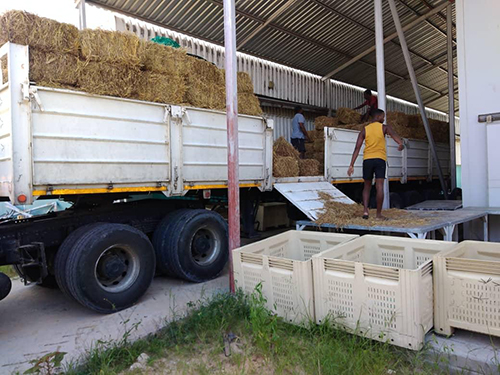Albertina Nakale
Agriculture remains the mainstay for many Namibians and the lack of access to quality seeds, equipment and transport have hugely impacted the livelihoods of those in the drought-stricken Kunene region.
These are some of the challenges highlighted during the Improving Rangeland and Ecosystems Management (IREMA) project’s training of trainers on horticulture production in Khorixas, Kunene region last Friday.
The training highlighted techniques to reduce vulnerability and improve food security through drought-tolerant crops. Kunene is one of the driest regions in Namibia, compounded by consecutive years of drought.
Most farmers in Kunene depend on livestock farming and dabble in crop production.
Charlie Mwaetako, the chief agricultural officer of the ministry of agriculture, noted that the situation of crop production in the Kunene region is critical as the region is hazard-prone.
He said the region is where poor and vulnerable farmers may not even have access to the traditional sources of the seed for their preferred varieties, and are not well- acquainted with planting.
“Hence, this training provides an opportunity for farmers to learn and to become leading farmers,” Mwaetako added.
The Environmental Investment Fund and the IREMA Project unveiled funding for the training of lead farmers.
Meanwhile, Lydia Ndinelao Horn, senior lecturer and researcher at the University of Namibia, said there is a need to diversify crop production, depending on seasons.
In order to increase the resilience of farming systems to the various disasters or human-induced hazards, farmers need to get an opportunity to get seeds of various crops which can perform under the challenging conditions the Kunene region is experiencing, she observed.
The training was aimed at providing skills that empower farmers with knowledge on horticulture production, and to also improve their cropping practices.
The training brought together 45 farmers who were chosen from the Sesfontein constituency and the Khorixas district to be the lead farmers who are being trained so that they can train other community members afterwards. The selected farmers who attended the training have in the past received agroforestry seedlings, and will this year receive drip irrigation materials to assist them with their horticulture production. The training also shared mechanisms and techniques that enhance crop varieties which produce higher yields during a shorter growing period.
It will furthermore assist farmers in using cowpea that is associated with adding nitrogen to the soil, hence reducing the need for nitrogen fertilisers and thereby boosting soil fertility and providing a more sustainable crop yield.
Environmental Investment Fund of Namibia spokesperson Lot Ndamanomhata encouraged the lead farmers to ensure that they go into their communities and share the knowledge attained over the two days of training.
He further urged farmers to procure goods from each other in order to ensure that the ripple-effect of their product remains within their communities.
This, he believes will lead not only to an improvement in their livelihoods, but also generate possible incomes for individuals and homesteads.
–anakale@nepc.com.na



